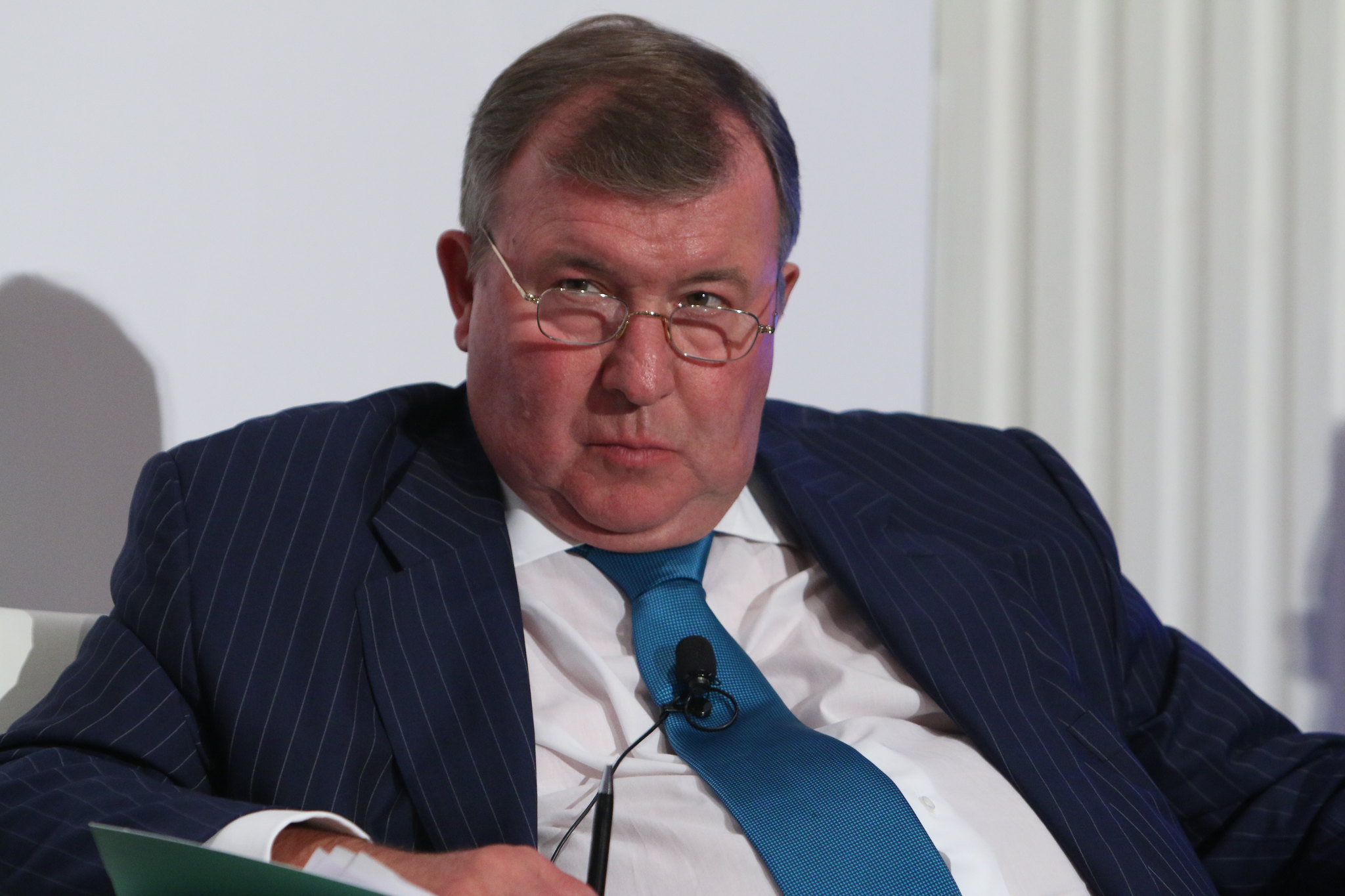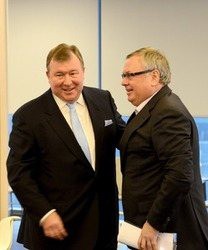Szymon Krawiec (Fundacja Reporterow)
Hana Čápová, Eva Kubániová (Investigace.cz)
Szabolcs Panyi, Andras Szabo (Direkt36.hu) 2019-08-03
Szymon Krawiec (Fundacja Reporterow)
Hana Čápová, Eva Kubániová (Investigace.cz)
Szabolcs Panyi, Andras Szabo (Direkt36.hu) 2019-08-03
Many Western allies of Hungary are worried about Russia’s International Investment Bank (IIB) having moved its seat to Budapest. In the meantime the government of Hungary and IIB’s management are arguing that this is only a regular international bank and cannot even be categorized as ‘Russian.’ However, VSquare and its partners reveal how IIB’s head is closely linked with one of Putin’s key bankers, Andrey Kostin. Moreover, press reports from 2013 reveal how the Kremlin might have been thinking about IIB during the process of its revival: as a possible home for offshore money fleeing Cyprus.
The International Investment Bank was founded in 1970 with the aim of supporting trade within the Soviet bloc – to create the communist alternative of the World Bank or the European Investment Bank. It did not fulfil its goal, and it went dormant after the fall of the Soviet Union. Poland and Hungary both left the institution in 2000.
However, the Russian government decided to revive the bank in 2012. Nikolay Kosov became the chairman of IIB, it was reorganized and Hungary re-joined in 2015. A big step was taken this year: IIB moved its seat from Moscow to Budapest. The management board of the bank already held its first meeting in the new headquarters in July.
You can read our detailed story of how the government of Hungary invited IIB to Budapest while its Visegrad partners – Slovakia, Poland and the Czech Republic – had their reservations about the revival of IIB and tried to distance themselves from the bank. Poland did not even renew its membership.
Budapest. A welcoming gateway to Europe for a Russian bank
The management board of the Russian-led International Investment Bank (IIB) held its first meeting in its new headquarters, Budapest, this week. The move of IIB from Moscow to Budapest has been controversial since it was announced: experts, historians and the media have been worried that the bank would be a tool for the Kremlin to […]
The move of IIB to Budapest has been controversial from the beginning, but Western allies of Hungary raised their doubts loudly after it was revealed in the spring of this year that IIB employees will have complete diplomatic immunity and Hungarian authorities will have no tools whatsoever to oversee the work of the bank. Leaders of international banks often enjoy diplomatic immunity, IIB claims. However, in the case of IIB not only the management but all the employees, their family members and their guests will be able to enter Hungary, that is, the Schengen Zone without questions from Hungarian authorities.
However, the worries of experts, foreign diplomats and allied governments are based on more than only the immunity given to IIB employees.
They explain their concerns by the fact that the head of IIB Nikolaj Kosov was born and raised in family of two KGB officers and among his closest banking partners is a member of Putin’s inner circle, Andrey Kostin.
The New York Times recently wrote, citing anonymous sources, that Western officials believe that Nikolay Kosov also served in Russian intelligence. IIB denied this to the newspaper.
In March the bank issued a detailed press statement that stressed that IIB was an international bank where more than 50 percent of shares were controlled by European Union member states. ‘IIB can never be a “Russian bank” or “Hungarian bank” as it does not comply with national jurisdiction of any country,‘ the statement says.
Kosov and his story
In 1956, KGB head Ivan Serov dispatched a handful of KGB operatives to Hungary to help crush the uprising against the Hungarian People’s Republic and its Soviet-imposed policies. According to a former senior KGB officer Sergey Kondrashev, among them was Nikolay Kosov, Sr., who was sent to Hungary ‘presumably to exploit contacts from his earlier service under journalist cover in the United States.’ The squad’s top priority was to identify how Western governments and secret services ‘supported or planned to support the revolution,’ and to ‘anticipate and foil any direct Western intervention and clandestine help to the rebels.’
Later in the 70s, the IIB chairman’s father, Nikolay Kosov, Sr. was leading ‘Service A’ at the KGB’s First Directorate, a department that was – among others – in charge of hostile operations against Jewish groups and the Zionist movement.
Mother of Nikolay Kosov was also a top-ranking KGB spy.
When asked about Kosov father’s role in fighting the Hungarian revolution of 1956, a senior Hungarian foreign ministry official commented that ‘we should stop politicizing economic issues, as this would prevent us from having business ties to almost everyone, including the USA and China.’
Nikolay Kosov jr, the head of IIB, said that he was very proud of his parents who had lived and worked in a different time and form of society. Kosov also mentioned that his father worked in Hungary and always appreciated the country. However, his parents have long died and, in his opinion, responsible journalism should not undertake this topic. Anyway, he believes that people living in the 20th century are wrongly judged and a different approach would be needed.”
How IIB is tied to Putin’s inner circle
The 2014 May leadership meeting in Cuba of the International Investment Bank, was important for at least two reasons.
The bank’s council, its highest decision-making forum, formally accepted Hungary’s application to welcome IIB in Budapest. The council members also decided that the bank would grant observer status to the Russian banking giant VTB. The status provided VTB with an insight into IIB’s operations, including meetings, sessions of the council, and access to internal processes and decision makings of IIB.
‘This observer status is strange. This is not an ordinary model,’ a former economic official of the Orban government told reporters. The source, who asked for anonymity to talk about sensitive issues, said that other multilateral banks, like the EBRD and the World Bank, do not offer similar status to commercial banks.
But the IIB representatives disagree that there is anything strange about the decision. ‘Observer status does not guarantee access to any insights’ said IIB. ‘It only allows participation in the Bank’s open sessions and business forums, where institutions with such status can promote their products and services to shareholders and partners of IIB’, they added.
VTB is the second largest bank in Russia and its majority shareholder is the Russian state. Its chairman, Andrey Kostin regularly reports to Russian president Vladimir Putin. Kostin also happens to be a longtime friend of Nikolay Kosov, the chairman of IIB.

Nikolay Kosov, chairman of IIB. Photo: Inter-American Dialogue (CC BY 2.0)
VTB is one of the Russian companies that have been targeted by the sanctions the U.S. and the EU introduced over Russia’s aggression in Ukraine. Kostin is also personally sanctioned by the U.S. It means that his U.S. assets are frozen and that American entities are banned from doing any business with him.
‘Being an international development financial institution, IIB is not subject to any sanctions’ IIB said in a statement to Direkt36/VSquare journalists, stressing that ‘it carries out its activities strictly in accordance with international compliance regulations’ and ‘taking into account existing sanction restrictions.’
The bank added that ‘hence, IIB was unfortunately forced to refrain from further business activity with VTB after 2014.’
More than business – friendship
The relationship between Nikolay Kosov and Andrey Kostin goes back to the end of the Cold War. They both worked as diplomats and served at the Soviet Union’s UK embassy in the late 1980s. ‘We had worked together in London for many years and become friends’ Kosov recalled in a 2013 interview, adding that it was Kostin who lured him into the banking sector. Kosov’s son, Pavel Kosov, became a senior manager at VTB.
IIB said in reply to VSquare project journalists questions that ‘Mr. Kosov and Mr. Kostin have indeed been friends for a long time’ and ‘yes, they are still in close contact.’ The bank claimed that they do not discuss IIB’s operations.

Andrey Kostin and Nikolay Kosov, 2013; photo source: IIB
Guardian’s former Moscow correspondent, Luke Harding in his book Collusion: Secret Meetings, Dirty Money, and How Russia Helped Trump Win quoted unnamed intelligence sources as saying that they thought Kostin had been a spy of the KGB.
However, nobody provided more direct evidence on Kostin’s alleged intelligence activities, and VTB denied in a statement that Kostin ever worked for the KGB.
Kostin is considered one of the Kremlin’s insiders. He acknowledged his close relationship with Putin in an interview he gave to a US television program in 2015. ‘You know, in Russia, when you’re a chairman of the largest bank, you visit the president and see him from time to time’ said Kostin. He added that he has known Putin for nearly two decades. ‘He knows me very well, I know him very well at least. But my relationship is limited to what I’m doing, we don’t discuss much broader issues.’
Toxic clients – Cyprus
Another interesting detail from the Russian press reveals how the Kremlin was thinking of IIB at the time when it was being revived: that the bank could be a new home for Russian money being squeezed out from Cyprus.
There is no proof that this idea was ever put into practice, but helps illustrate the Kremlin’s thinking about the role of the bank in 2013.
In April 2013 RT reported, based on a report by Finmarket, citing finance ministry sources that Russian Deputy Prime Minister Igor Shuvalov suggested that IIB could be made into a ‘domestic offshore’ bank, using its special international status.
According to the report, Shuvalov discussed the idea with the Russian Central Bank and the International Investment Bank, which in his opinion could be granted the status of a domestic offshore bank.
The RT report, based on Interfax’s sources, claimed that creating a domestic offshore bank from IIB made sense because ‘it already possesses an exclusive status, making it nearly an offshore bank.’ It also mentioned that IIB ‘cannot be supervised by member states. It is also spared of taxes and protected from any judicial and administrative interference. It also has a diplomatic organization status.’
What is behind this idea is that Russian money needed a new home after it was forced to flee Cyprus in those years. According to a report by The Financial Times, in 2011 Cyprus was the number-one destination for Russian money being sent abroad and estimated Russian wealth based in Cyprus to be between €8 billion and €35 billion. The latter number is based on German intelligence reporting cited by Der Spiegel.
However, this amicable situation in Cyprus changed.
‘Amid sanctions and tightening compliance, Cyprus banks prefer not to deal with Russian money and Russian clients, even those who’ve had accounts in Cyprus banks many years,” says Evgeny Kogan, former director of the Center for Protection of Shareholders and Investor Rights of Cypriot Banks for Bloomberg. ‘Russian clients are becoming toxic.’
In 2013 Polish Gazeta Wyborcza reported that because of the precarious financial situation in Cyprus, Russian government came with the idea of creating a new ‘domestic offshore’. They have chosen IIB to be the new “inland offshore” and serve as a space for the money that would no longer be in Cyprus.
Our reporters reached out to IIB asking for a comment about the Russian government’s idea of using it as a domestic offshore but they did not reply to our inquiry.







